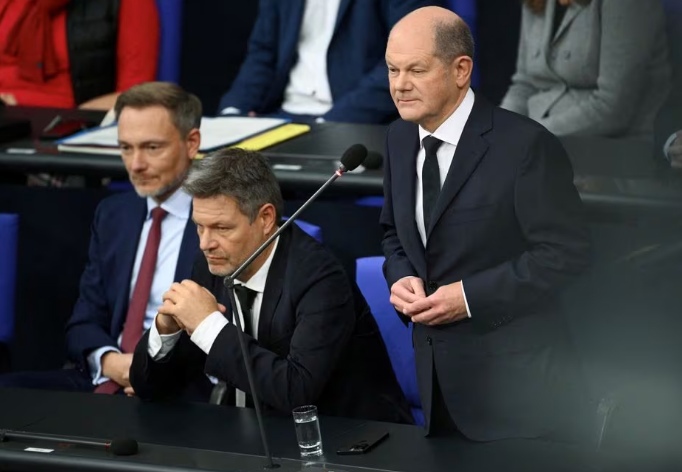Germany’s struggling economy is scrambling for a way out of a budget crisis after a court rejected billions in funding for clean energy projects and help for companies and consumers hit by huge utility bills because of the war in Ukraine, APNews reports.
Olaf Scholz is scheduled to appear before parliament on Tuesday to outline how his ruling coalition can fix the situation. Analysts say the government must find cuts as soon as possible in its almost-completed spending plan for next year, which could further slow an economy that is already performing the worst in the world.
However, a long-term solution to the problem could take years, possibly until the next national elections in 2025. This is because the strict legal restrictions on borrowing referred to in the court’s 15 November ruling are enshrined in the country’s constitution, and a two-thirds majority in parliament is needed to ease them.
Economists say the spending cuts could compound the problems facing Europe’s largest economy after Russia cut off access to the cheap natural gas that powers its factories, hitting businesses and raising the cost of living for households who now have to pay more for energy.
On Friday, vice-chancellor Robert Habeck noted the debt rules were passed at a time when peace reigned and climate change was not taken seriously. He said:
“We’ve voluntarily tied our hands behind our backs, and we’re going into a boxing match.”
Referring to the massive public investment in green technology in the US and China, he added:
“The others have horseshoes in their gloves, and we don’t even have our hands free. It’s clear how that will end.”
Germany’s Constitutional Court has cancelled about 60 billion euros ($65 billion) of spending for this year and next. The court ruled that the government could not reallocate unused funds meant to fight COVID-19 to develop wind and solar projects, pay electricity bills and encourage investment in computer chip production, according to APNews.
The constitution states that the budget deficit should not exceed 0.35 per cent of economic output, but in an emergency, such as a pandemic, the government can go beyond that limit.
The ruling could extend to other state and local spending, based on the same currently rejected accounting manoeuvre, and cover up to €130 billion of spending expected up to 2027. Some of the disallowed expenditures have already been spent this year. To comply with the ruling, the government is amending the 2023 budget by declaring a state of emergency, citing Russia’s cut-off of natural gas supplies and rising energy prices.
According to Holger Schmieding, chief economist at Berenberg Bank, without another declaration of a state of emergency next year, the government will have to urgently cover a deficit of 30-40 billion euros, plus 20-30 billion euros for 2025, up from previous plans.
Part of the costs could be taken over by the country’s development bank or transferred to a public-private partnership. However, it could be limited to that. Schmieding said spending could eventually be cut by 0.5 per cent of annual economic output over the next two budget years.
Debt limits were imposed in 2009 after the government racked up debts to rebuild the former East Germany after German reunification at the end of the Cold War, and after tax revenues plummeted during the 2007-2009 global financial crisis and the Great Recession.
For years afterward, Germany balanced its budget or even ran a small surplus as the economy lived off cheap Russian natural gas and booming exports of luxury cars and industrial equipment, with fast-growing China as its main market. Economists say the government underinvested in infrastructure, renewable energy and digitalisation and is now trying to catch up.
The International Monetary Fund predicts Germany will have the worst performance among major economies this year, contracting by 0.5 per cent, APNews reports.
The outlook for next year is not much brighter. Industry is struggling with energy prices and a shortage of skilled labour, while Chinese carmakers are challenging Germany’s Volkswagen, BMW and Mercedes-Benz and planning to expand their market across Europe.
The budget debate is ironic because Germany has the lowest long-term debt of all the Group of Seven advanced democracies: its debt is 66 per cent of gross domestic product. This compares with 102 per cent in the UK, 121 per cent in the US, 144 per cent in Italy and 260 per cent in Japan.
The spending now banned was aimed at addressing some of the long-term problems hindering economic growth, such as the need to invest in new sources of affordable renewable energy such as wind, solar and hydrogen. This has led some to call for a loosening of debt restrictions as they limit the government’s ability to respond to new challenges.
But Scholz’s coalition of Social Democrats, Greens and pro-business Free Democrats does not have the two-thirds majority to do so without the conservative opposition, the Christian Democrats, who launched the legal challenge in the first place.
Nevertheless, even some governors of opposition states have said that debt restrictions should be eased. Berlin Mayor Kai Wegener, a member of the Christian Democrats, said the provision would be a “brake on the future.”
